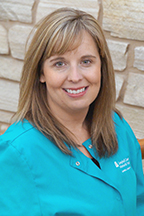Five ways to improve your sleep
- Posted On:
- Written By: Dessie Hoxie, Sleep Coordinator, CCH Sleep Center

by Dessie Hoxie, Sleep Coordinator
CCMH Sleep Center
Did you know that May is dubbed Better Sleep Month by the Better Sleep Council? Refreshing sleep is very important to your health, and the aim of Better Sleep Month is to encourage people to create better sleeping patterns.
If you have trouble getting to sleep at night or not feeling rested when you wake up, sometimes just making small changes can dramatically improve the quality of your sleep. Check out these five tips to help you get a better night's sleep.
Turn your bedroom into a Sleep Sanctuary
- Evaluate your current sleep environment for light, touch, and sound. Sunlight is a positive source of energy during the day that triggers the brain to wake-up but can disrupt restful sleep. Sleep with light blocking window coverings, and eliminate exposure to light from electronic devices like computers and TV prior to going to sleep. Keep in mind that this has a reverse role to start your day with light exposure for faster wakefulness.
- Replace your mattress if it’s more than sevent years old - most people will spend 1/3 of their life in bed.
- Reduce noise from interrupting your sleep. Ear plugs may be helpful, or noise reduction window coverings. A white noise in the background, such as a fan or sound machine (not TV) may eliminate external factors.
- Lastly, one necessary rule to follow, use your bedroom for sleeping and sex only. When you walk into your bedroom, it should be a place to unwind and relax.
Sleep rituals
Rituals prior to bed help trigger the brain response to when it’s time to sleep. Our bodies work on a 24 hour internal clock known as your Circadian Rhythm. It is ideal to keep a consistent sleep schedule, but many life factors can prevent this from happening. Establishing rituals that you do prior to sleeping can help establish sleep and wake times when your normal routine is altered. Sleep rituals to consider: a light snack, warm bath, reading, relaxation techniques like deep breathing or yoga, or a five minute massage, (if you can convince your bed partner it’s necessary).
Food and medications
Certain foods and medication can affect your ability to fall, maintain, and wake from sleep. Caffeine, alcohol, nicotine, and high sugar drinks all stimulate wakefulness. Both caffeine and alcohol increase trips to the restroom. Carefully read and understand your medication sleep side effects. Working with your healthcare provider and scheduling optimal times to take your medication will your be beneficial for your sleep.
Put some pep in your step
Starting you day with even mild to moderate exercise for 20-40 minutes helps induce wakefulness. Don’t fall under the spell of the mid-day fatigue. Take a short brisk walk to stimulate energy. Don’t like waking earlier on an already early morning? Evening exercise helps reduce daytime stressors that may get in the way of you falling asleep.
Recognize the signs of a possible sleep disorder
Do you wake up feeling more tired than you went to bed? Do you snore? Has anyone told you that you quit breathing during sleep? Does your fatigue affect your daytime routine? Sleep Disorders can be easily overlooked because we become accustomed to our poor sleep. If you find that it is necessary to regularly take medications to sleep or wake, it’s time to investigate the source. There are more than 80 different types of sleep disorders that can be the culprit to your restless nights and sleepy days. Leaving sleep disorders untreated can lead to serious health conditions like high blood pressure, depression, diabetes, weight gain, stroke, heart attack, and/or increased risk for work or motor vehicle accidents.
And, if you do believe you have a sleep disorder, the Sleep Center can help you. You are welcome to call me at 307-688-2351 for a free sleep assessment.
The Sleep Center at Campbell County Health can diagnose and treat over 70 different sleep disorders, and was recently accredited by the American Academy of Sleep Medicine. It’s one of only three accredited sleep centers in the state of Wyoming. The most commonly treated sleep disorders are snoring, sleep apnea, insomnia, restless legs syndrome, and shift work disorder. Learn more at www.cchwyo.org/sleep.
